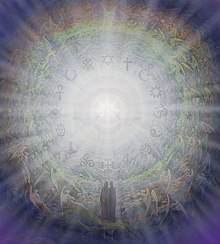Rufus Jones (writer)
Appearance

Rufus Matthew Jones (25 January 1863 – 16 June 1948) was an American writer, magazine editor, philosopher, historian and theologian who was one of the most influential Quakers of the 20th century. He was instrumental in the establishment of the Haverford Emergency Unit (a precursor to the American Friends Service Committee), and the only person to give two Swarthmore Lectures, the first of them all, in 1908, and his second in 1920.
Quotes
[edit]


- There has always been in the Society of Friends a group of persons pledged unswervingly to the ideal. To those who form this inner group compromise is under no circumstance allowable. If there comes a collision between allegiance to the ideal and the holding of public office, then the office must be deserted. If obedience to the soul's vision involves eye or hand, houses or lands or life, they must be immediately surrendered. But there has always been as well another group who have held it to be equally imperative to work out their principles of life in the complex affairs of the community and the state, where to gain an end one must yield something; where to get on one must submit to existing conditions; and where to achieve ultimate triumph one must risk his ideals to the tender mercies of a world not yet ripe for them.
- Quakers in the American Colonies (1911), p. 175
- If we are to prove that Fox really struck a jet of living water, we ourselves must tap that same fountain.
- As quoted in Living in the Light : Some Quaker Pioneers of the 20th Century Vol. I, (1984) by Leonard Stout Kenworthy, p. 126
Social Law in the Spiritual World (1904)
[edit]- Mysticism has been for the most part sporadic. It has found an exponent now here, now there, but it has shown little tendency toward organizing and it has manifested small desire to propagate itself. There have been types of mystical religion which have persisted for long periods and which have spread over wide areas, but in all centuries such mystical religion has spread itself by a sort of spiritual contagion rather than by system and organization.
It has broken forth where the Spirit listed, and its history is mainly the story of the saintly lives through which it has appeared. The Quaker movement, which had its rise in the English Commonwealth, is an exception. It furnishes some material for studying a "mystical group" and it supplies us with an opportunity of discovering a test and authority even for mystical insights
- No person can ever hope to gain an adequate idea of the religious movement which has been called by the name of Quakerism until he has discovered what is meant by the "Inner Light." It is the root principle of an important historic faith, and it deserves a careful examination.
The term "Inner Light" is older than Quakerism, and the idea which is thus named was not new when George Fox began to preach it. But this idea received a meaning and an emphasis from the Quakers which make it their own peculiar principle and their distinct contribution to religious thought.
- The Inner Light is the doctrine that there is something Divine, "something of God," in the human soul.
Five words are used indiscriminately to name this Divine something: "The Light," "The Seed," "Christ within," "The Spirit," "That of God in you." This Divine Seed is in every person good or bad.
What Will Get Us Ready (1944)
[edit]

- The Society of Friends is not a yearly meeting, not a Five Years Meeting, not an occasional conference, not a central office somewhere, not a series of committee meetings; it is primarily and essentially a widely scattered number of local meetings, little cells, where the actual vitality and power and future potency of Quakerism is being settled and determined. We work in vain unless we keep our minds focused on these local units.
- I want to make perfectly clear the act that the world is in the fringe, in the penumbra, of a tremendous Revolution, with a big R. We have called it a war and the fighting has been with mechanized weapons, but we shall soon be face to face with awesome situations against which weapons are vain things, as ineffective as Canute’s futile attempts to stop the irresistible tides of the ocean. Nothing is ever going to be the same again and we cannot assume our Quakerism is to be unaffected by the euroclydon that is in front of us. The time has passed for “the complacent assumption of an unchanged world.” This situation which I see coming — though I am afraid most Americans are looking forward fondly to a new period of “normalcy” — this situation makes it more urgent than ever to have our Quaker Society inwardly prepared to be a purveyor of light and leading when the crisis comes. The Christian faith of the ages will be tested more severely than in any former Revolution, because it will be confronted with its supreme enemy, a completely economic, materialistic, and mechanistic interpretation of the word and of human life.
- There is a dearth of genuine philosophy of life and of a convincing interpretation of spiritual reality. It may well fall to our lot to be the remnant body to maintain and uphold the genuine spiritual interpretation of life and of man’s divine endowment as our founders dd against the prevailing Calvinism of that formative epoch. Anyhow, whether my prophecy is real or vain, our task under God is plainly marked out for us. We must get ready, and my mind turns all the time to the local meeting centers where the issues will be settled.
- Most persons are awakened and set on their new track of life through the quickening and kindling power of some person who becomes for them the instrument of inspiration and of the creation of faith and the vision of a nobler way of life. Persons are set on fire by someone who is already aflame. It is a trumpet call to high adventure that starts the forward movements away from old forms.
That is one of the greatest stories in the long history of religion. It was through a long and wonderful circuit of souls, in a succession of forerunners, that the kindling idea of “Something of God in the soul of man” came to George Fox.
- The point I am trying to make clear is the fact that if we are to see a resurgence of life and power in our beloved Society we must open the way for vital, kindling, inspiring persons to visit, or better still to live in, the communities where there are, or ought to be, meetings.
- If we are to reach and garner the present day seekers who exist in every neighborhood, persons who are disillusioned over the effectiveness and value of the ordinary run of church service, our Quaker meetings must become unique centers of spiritual life, where there is felt a thrill of reality. That means that they must be occasions when life is lifted up and seen and felt in its true divine possibilities.
I am looking for a time, and not counting on it, when we shall have a Society of Friends not composed of a few awakened leaders and a body of unkindled quiescent members who move in the ancient grooves of habit and routine. But instead a live membership of persons who have thought out their principles of life and not merely adopted them second hand.
- There is very great need to have the unique aspect of spirit in man and its relation to the divine spirit in the universe freshly interpreted in a world that has become bogged down with material conceptions of life and the world.
There is very great need of a more vital grasp of the unique Person at the headwaters of our faith linked up with the Real Presence of the inward Christ who is the Life of our lives…
Christian Mystics (1999 - 2014)
[edit]
- I have a profound faith that the times are ripe for a signal advance in religious belief and life and practice — for a Christianity translated into the terms of life and thought and action of the age in which we are actually living. There cannot be any great continuing civilization without the undergirding of religious inspiration….
- We shall not be able to rebuild our shattered world until we recover our faith in eternal realities, and we shall not do that until we discover spirit within ourselves.
- p. 8
Quotes about Jones
[edit]- Mystical union with the divine, according to Jones, was not a privilege reserved only for the great spiritual athletes. But Jones did not just theorize — he also popularized. His willingness to market himself to the masses was a critical stimulus towards the popular embrace of a mystical emphasis in liberal Protestant spirituality, both because of his own direct influence and because of his influence on even more popular writers such as Howard Thurman and Harry Emerson Fosdick. This middlebrowing of mysticism paved the way for the success of a wide range of mystical writers to come, starting with Thomas Merton and lasting into the New Age.
- Matthew S. Hedstrom, in "Rufus Jones and Mysticism for the Masses" in Cross Currents, Vol. 54, No 2 (Summer 2004)

